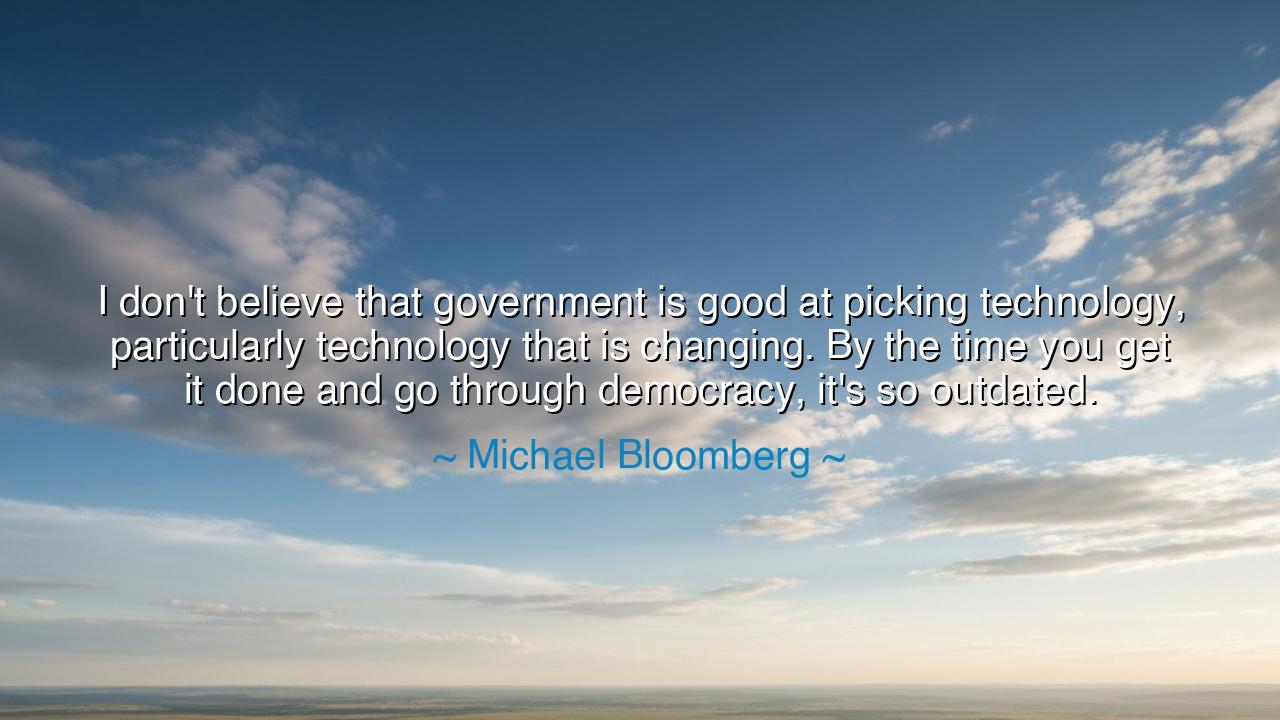
I don't believe that government is good at picking technology
I don't believe that government is good at picking technology, particularly technology that is changing. By the time you get it done and go through democracy, it's so outdated.






"I don't believe that government is good at picking technology, particularly technology that is changing. By the time you get it done and go through democracy, it's so outdated." Thus spoke Michael Bloomberg, a man who rose from the world of innovation and enterprise to the realm of governance. In these words, he unveils a truth both modern and eternal — that Government, though mighty in authority, often moves with the slow tread of law and process, while technology races like lightning through the ages. His statement is not an insult to democracy, but a reflection of its nature: that freedom, though precious, often walks slower than invention. In the swift current of change, by the time a decision is reached through debate, consensus, and compromise, the world may already have moved beyond the problem it sought to solve.
Bloomberg’s insight was born not from theory, but from the crucible of experience. As a builder of both business and public policy, he saw how swiftly innovation transforms the world — how ideas born in the morning can become obsolete by nightfall. In the halls of government, where decisions must pass through committees, votes, and bureaucratic caution, progress is deliberate, but time is merciless. He understood that the machinery of democracy, noble and necessary though it is, was not designed for speed. It was built to preserve fairness, not to chase the future. Thus, when it attempts to command the tides of technology, it finds itself forever a step behind.
The truth of his words can be seen throughout history. In the early days of the Industrial Revolution, governments watched as steam, steel, and electricity reshaped the world faster than they could comprehend. While inventors like James Watt and George Stephenson pushed humanity forward, monarchs and parliaments hesitated, uncertain how to govern the new forces they had unleashed. Regulations lagged behind innovation, and entire societies were transformed before the law could catch up. The same pattern repeats today, as digital technology outpaces the reach of legislation. By the time a law is written to govern one kind of machine, a newer, faster, more powerful one has already taken its place.
Yet this is not a curse upon democracy, but a test of its wisdom. The slowness of government is both its weakness and its strength. It moves with caution because it bears the weight of the people’s trust. The swift hand of authority can achieve wonders — but it can also destroy with equal speed. History reminds us of rulers who sought to command innovation by decree, from emperors who burned printing presses to dictators who silenced scientific minds. Their regimes advanced for a season, only to collapse beneath the weight of tyranny. Thus, Bloomberg’s warning is double-edged: while government must learn to adapt more quickly, it must never abandon the deliberation that preserves liberty.
In our own age, the struggle between innovation and governance grows fiercer by the day. The rise of artificial intelligence, genetic engineering, and digital surveillance poses questions that outpace even the most forward-thinking legislator. Should we restrain these powers, or embrace them? Should they belong to the few, or to all? The dilemma that Bloomberg describes is not merely about speed — it is about wisdom. For technology is a force neither good nor evil; it becomes what its masters make of it. And if government cannot keep pace, then the duty falls upon citizens and innovators alike to act with conscience, foresight, and humility.
The meaning of Bloomberg’s words, then, is this: that progress must not wait for permission, but must be guided by principle. Government may not be swift, but it must be wise; innovation may not be restrained, but it must be ethical. Each must respect the role of the other — the inventor to create, the lawmaker to protect, the people to discern. Only through harmony between these forces can civilization advance without losing its soul.
The lesson is clear for all who live in this age of rapid change: do not depend solely on institutions to guide the future. Become stewards of knowledge and guardians of virtue. Demand that your leaders learn, but also learn faster than they lead. Support freedom in invention, but demand responsibility from those who wield it. Let technology serve mankind, not enslave it, and let government learn not to dictate innovation, but to safeguard its fruits for all.
So remember the wisdom of Michael Bloomberg: that while democracy may move slowly, its strength lies not in haste, but in balance. Let those who govern learn to adapt, and those who innovate learn to respect the moral order of their creations. For progress without conscience leads to ruin, and conscience without progress leads to decay. The harmony of both — swift thought and steady judgment — is the true path to a civilization that endures beyond the rise and fall of every fleeting invention.






AAdministratorAdministrator
Welcome, honored guests. Please leave a comment, we will respond soon